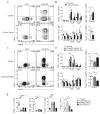Tissue adaptation of regulatory and intraepithelial CD4⁺ T cells controls gut inflammation
- PMID: 27256884
- PMCID: PMC4968079
- DOI: 10.1126/science.aaf3892
Tissue adaptation of regulatory and intraepithelial CD4⁺ T cells controls gut inflammation
Abstract
Foxp3(+) regulatory T cells in peripheral tissues (pT(regs)) are instrumental in limiting inflammatory responses to nonself antigens. Within the intestine, pT(regs) are located primarily in the lamina propria, whereas intraepithelial CD4(+) T cells (CD4(IELs)), which also exhibit anti-inflammatory properties and depend on similar environmental cues, reside in the epithelium. Using intravital microscopy, we show distinct cell dynamics of intestinal T(regs) and CD4(IELs) Upon migration to the epithelium, T(regs) lose Foxp3 and convert to CD4(IELs) in a microbiota-dependent manner, an effect attributed to the loss of the transcription factor ThPOK. Finally, we demonstrate that pT(regs) and CD4(IELs) perform complementary roles in the regulation of intestinal inflammation. These results reveal intratissue specialization of anti-inflammatory T cells shaped by discrete niches of the intestine.
Copyright © 2016, American Association for the Advancement of Science.
Figures




Comment in
-
IMMUNOLOGY. Converting to adapt.Science. 2016 Jun 24;352(6293):1515-6. doi: 10.1126/science.aag1719. Science. 2016. PMID: 27339967 No abstract available.
References
Publication types
MeSH terms
Substances
Grants and funding
LinkOut - more resources
Full Text Sources
Other Literature Sources
Molecular Biology Databases
Research Materials

